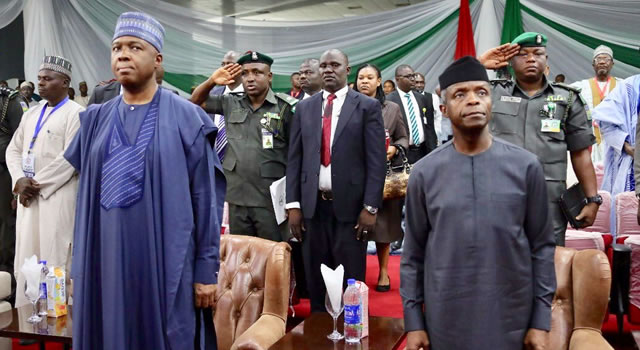Politics
Osinbajo makes case for state police to end herdsmen killings, insecurity (Updated)

Vice President Yemi Osinbajo on Thursday canvassed state police as the solution to the wanton killings by suspected Fulani herdsmen across the country and other security issues.
Speaking at the opening ceremony for the two-day summit on national security organised by the Senate on the spate of killings by herdsmen and other crimes across the country, Osinbajo said, “State police is the way to go.”
The event was held at the NAF Centre in Abuja, it moved into closed doors after the opening ceremony.
Osinbajo stated that the Federal Government lacked the powers to seize land from states for the establishment of grazing reserves or livestock production centers, adding that herdsmen would pay for the services to be rendered by the proposed ranches or grazing reserves by the government.
He said, “Let me reiterate that on no account will any land be seized or forcefully taken to create ranches or grazing areas. All insinuations to that effect should be disregarded. No one is giving land to herdsmen, as is being falsely alleged.
“Instead, it is in our view that states that are willing and have set aside land for development should cooperate with willing investors in commercially-viable, government-supported ranches or livestock production centres for commercial use.”
Osinbajo meanwhile, noted that some states, especially in the North, had duly gazetted grazing reserves, explaining that a majority of these grazing reserves are degraded and without pasture or water, especially during the dry season.
“There is also a clear sense which I think must be appreciated, that the Federal Government cannot dictate to states what to do with their land. This is so because the Land Use Act of 1978 puts land under the control of governors on behalf of their states.
“Also, the Supreme Court in the case of the Attorney General of Lagos State versus the Attorney General of the Federation in 2004, held that the use of land resources and permits for such use lie firmly in the hands of state governments. Even for use of federal lands in the states according to the Supreme Court, building or development control permit must be sought from the governors of the states,” he added.
Osinbajo further noted that grazing routes leading to these reserves must also be secured.
According to him, for the grazing reserves to be effective and operate effectively, they should be operated as ranches or livestock production centers on a commercial basis.
“The ranches will have adequate water from boreholes, salt points and pasture. The locations would serve both as forage points and centers for providing extension services to boost animal care, feeding and veterinary facilities, and even abattoirs. Because the ranches are commercial ventures, cattle owners will pay for their use.
“It is important to note that by and large, in consultation with stakeholders, all agree that where adequate provision is made on a commercial basis, there is no reason why there won’t be cooperation to use those ranches because there are both economic and social benefits for everyone, including herders,” he said.
He also disclosed that apart from states that had gazetted grazing areas that 13 states had agreed to allocate 5,000 hectares of land for ranching or livestock production.
Also in attendance were the Senate President, Bukola Saraki; Deputy Senate President, Ike Ekweremadu; Minister of Interior, Gen. Abdulrahman Dambazau (retd.); the service chiefs and senators.
On the decentralisation of the Nigeria Police Force and creation of state police as some of the ways to go in tackling the herdsmen and farmers’ violence in the country, the Vice President said, “The first is that the nature of our security challenges is complex. Securing Nigeria’s over 923,768 square kilometres and its 180 million people requires far more men and materials than we have at the moment. It also requires a continual re-engineering of our security architecture and strategies. This has to be a dynamic process.
“For a country our size to meet the one policeman to 400 persons, the United Nations prescribed ratio, it would require nearly tripling our current police force, far more funding of the police, military and security agencies is required.
“Secondly, we cannot realistically police a country the size of Nigeria centrally from Abuja. State police and other community policing methods are clearly the way to go.
“Thirdly, we must intensify existing collaboration with our neighbours in the Chad Basin, especially border communities, to prevent the movement of small arms, and disarming armed pastoralists and bandits who go through our borders day after day.
“Lastly, we must avoid the dangers of allowing these conflicts to become religious or ethnic conflicts. This is the responsibility of political, religious and all other parts our leadership elite in Nigeria.”
RipplesNigeria… without borders, without fears
Click here to join the Ripples Nigeria WhatsApp group for latest update
Join the conversation
Support Ripples Nigeria, hold up solutions journalism
Balanced, fearless journalism driven by data comes at huge financial costs.
As a media platform, we hold leadership accountable and will not trade the right to press freedom and free speech for a piece of cake.
If you like what we do, and are ready to uphold solutions journalism, kindly donate to the Ripples Nigeria cause.
Your support would help to ensure that citizens and institutions continue to have free access to credible and reliable information for societal development.
























